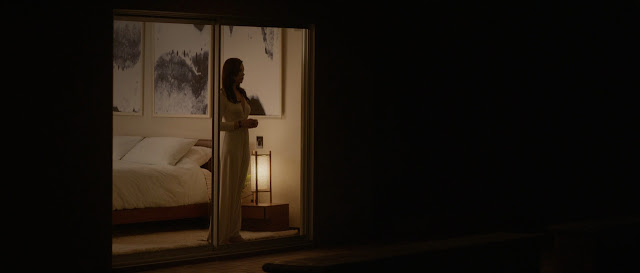While attending a dinner party thrown by his ex-wife, Will (Logan Marshall-Green) starts to suspect that she and her new husband have sinister plans for the guests. Written by Phil Hay and Matt Manfredi, and directed with glinting precision by Karyn Kusama, The Invitation is an incredibly taut and haunting work underpinned by ideas concerning grief, trauma, and the falsities of social conventions.
An early warning sign and tone-setter comes when Will and his girlfriend Kira (Emayatzy Corinealdi) hit a coyote in the road on the way to the party. This bloody encounter is a doomful harbinger of what is to come. Their conversation during the drive reveals neither of them – for their own reasons - are particularly keen on attending the party, which will reunite a group of friends for first time since Will and Eden (Tammy Blanchard) divorced after the tragic death of their young son. As Will wanders from room to room in his former home, he finds reminders and ghosts of his previous life. The singular setting of the house gradually adds to the claustrophobic atmosphere that manifests soon after they he and Kira arrive. The screenplay not only drills down into the ways in which grief and trauma can alter people, but also how those grieving are perceived by others. The reunited group are ill at ease from the outset and the cast ably portray the complex and shifting dynamics within the group as they tip-toe around the past and the grief that stems from it. The characters are believable, carefully drawn and, most importantly, flawed.
As events proceed, Kusama conjures and sustains tension in a deliberately measured way. Old wounds open and begin to seep amid polite company. Guilt and paranoia slowly begin to drift through the gathering. Tension emerges from shrewd social observances – forced politeness, the desire to fit in, acquiescence to peer pressure and social expectations, and an acute awareness of the loss and grief Eden and Will have experienced. When Eden and her new husband David (Michiel Huisman) reveal they have joined a commune called the Invitation, and then several of their fellow believers show up, including the imposing Pruitt (John Carroll Lynch), Kusama gradually tightens the screws to nerve-shredding proportions. While glances are exchanged, wine is guzzled and concerns gently raised, many of the friends try to ignore what their instincts are telling them: that something is very wrong. They want to support Eden, so attempt to conceal their uneasiness in the company of the other members of the commune. No one wants to appear impolite; no one speaks up when they feel something isn’t right because they don’t want to cause upset or embarrassment. No one, except Will, mentions the word 'cult'. Indeed, when Will voices his suspicions, everyone attributes his anxieties to grief and anger. When others voice concerns, the members of the commune placidly explain these away. Bubbling under throughout all this are concerns for the whereabouts and wellbeing of a guest who left early as she was uncomfortable with an incendiary party game, and the whereabouts of another guest who failed to show up at all.
Moments of social anxiety become charged with a sinister undertow. Ambiguous conversations reveal veiled threats that eventually explode into actual threat and bloody violence. Kusama masterfully adds these elements into a simmering cauldron, all the while slowly cranking it up to an unbearable boiling point before leaving us with an incredibly haunting denouement.

